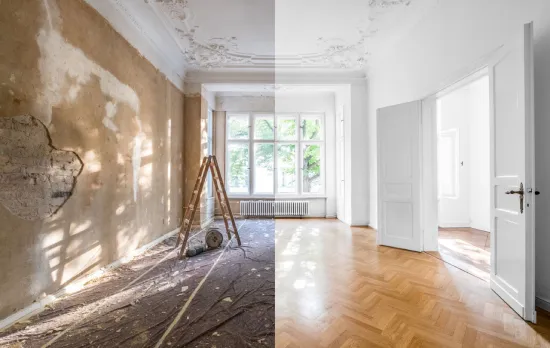Differences From Selling Co-op/Condo
Selling a townhouse can be different from selling a co-op or condo apartment. Some of these differences exist for both types of apartments, while a few are exclusive to a single type (co-op or condo).
Inventory: The inventory for townhouses is far smaller compared to co-ops and condos. As per the StreetEasy listings at the time of writing, co-ops outnumber townhouses by more than 21 to one, and condos outnumber them by 18 to one. As a seller, low inventory might mean less competition.
Market Dynamics: Another benefit of a small inventory is that it doesn’t take a large enough buyer pool to turn it into a seller’s market. This happened during COVID when the demand for townhouses rose as more buyers were looking for the safety and privacy of a wholly-owned residential space. However, market dynamics can just as easily sway in the opposite direction. Townhouses are, in general, costlier compared to condos and co-ops, and high-interest rates can price even more potential buyers out of the townhouse buyer pool.
Research Difficulty Because of Fewer Comps: As a seller, you may have difficulty finding an adequate number of comps (comparable properties) to come up with an accurate asking price because there are few sales. Also, the prices vary greatly, even for different streets within the same neighborhoods. Prices may also vary based on factors like the age of the property and preserved classic features. This may require sellers to lean more heavily on the expertise of the agents. Another problem with townhouse comps, especially if you compare them to co-ops and condos, is the lack of streamlining. With condos and co-ops, you can find comps from the same building, and the variance from the comps would be minimal and easy to account for. However, each townhouse may be considered a unique property with its own characteristic features and details.
Buyer Pool: The buyer pool for townhouses is comparatively smaller and influenced by factors like price, inventory, and commitment it requires. The pool may expand or shrink thanks to factors like COVID that encouraged more NYC homebuyers to seek private spaces. A smaller buyer pool (demand) is not necessarily a disadvantage as long as it is proportionally larger than the inventory (supply), allowing you to sell in a seller’s market where you may have more control over the transaction.
Location: Many of the location-related facts that buyers take into consideration when buying a new home in NYC are the same for townhouses, co-ops, and condos, like proximity to public transport hubs, noise, school districts, etc. However, factors like safety matter more in townhouses compared to co-ops and condos because they are independent housing units directly open to the neighborhood. For apartments, the building itself acts as an additional safety layer that can be augmented by a doorman and other security measures.
Approval Process: When you own a townhouse, you have the final say on your buyers. There is no board above you that might prevent you from selling to a buyer because they don’t match the board’s criteria for a homeowner, which is common in co-ops. Even in a condo, the board has the right of first refusal.
Closing (and Closing Costs): There is little difference between a townhouse and a condo when it comes to closing costs. However, the costs are higher compared to a co-op due to mortgage recording fees that don’t exist for co-ops (since they are not technically classified as property) and title insurance.
Repairs: When you are selling a townhouse, the scope of the repairs may be significantly substantial compared to apartments. That’s because the entire structure is your property. In a condo or a co-op, sellers are responsible only for the repairs needed within the walls of their apartment, and even some of them fall within the purview of building management, like heating/cooling, plumbing, etc. But in a townhouse, you are responsible for all repairs, including roof, exterior, HVAC, and even structural reinforcements like joists. If you are unable to or unwilling to make the repairs, you will have to drop your asking price adequately or leave enough money in the escrow for repairs.
Inspection: While it’s not a good practice, potential buyers may skip inspection for NYC co-ops and condos, but that’s not the case for townhouses or any other detached structures. So it’s important that you are ready and have prepared your property for a home inspection.
There are some other factors like cost considerations associated with property taxes, cost of property management, HOA fees, etc., but they are primarily for buyers.
FSBO or Agent
Regardless of the property type, FSBO is a viable option for a relatively small number of sellers. Even if you are willing to do the research and the legwork that an agent does, it’s impossible to replicate their experience, and the knowledge and understanding it comes with. The challenges of selling FSBO become even starker when it comes to a complex property type like a townhouse. Working with an agent that specializes in townhouses can be instrumental in a smooth sale because they may help you with an accurate asking price and guide you in phases like inspection and determining which repairs to make and how much you need to leave in the escrow for repairs. An agent can also guide you on how to highlight the strongest features of your property when dealing with potential buyers or when preparing your townhouse for inspection and assessment.
However, if you have chosen the FSBO route, it’s important to conduct comprehensive research on the comps to come up with a relatively accurate asking price. You should also consider getting an inspection to identify flaws in your property that buyer’s inspectors will look for and determine whether to make repairs or lower the asking price proportionally. You will also have to research townhouse listings to learn how to showcase your property in the most appealing way.
Finding The Right Agent
The right agent should at least have the following characteristics:
- Experience in selling townhouses, preferably in your neighborhood. The ideal case would be to find an agent that specializes in townhouses.
- They should have adequate knowledge of your neighborhood, so they can leverage more than just the core strengths of the property when presenting your property to potential buyers.
- Good marketing skills.
- They should be communicative and skilled in negotiation.
- They should give honest feedbackand discuss their reservations with you openly.
You may consider asking your friends and family that have worked with an agent in the past to sell their townhouse for references.
Short-Listing Buyers
- If you have multiple offers on your townhouse, you can take a few steps to identify the best possible candidate(s).
- Prioritize cash buyers over buyers that are buying through a mortgage. This automatically protects you against a mortgage contingency that gives you the option to back out of the deal.
- Potential buyers willing to waive contingencies should get priority.
- If you have no potential buyers willing to waive contingencies or offer to buy all cash, you should focus on buyers with strong financials and mortgage pre-approvals.
- Unless your townhouse is in perfect shape, you will have to make repairs once the issues are highlighted in the inspection. Otherwise, you may have to lower the asking price or leave the closing credit. This will also be influenced by the specifics of an inspection contingency. Cash-strapped buyers may lean more towards closing creditsthan a lowered asking price because the former will reduce their out-of-pocket expenses. So if two buyers have made the same offer and you know that substantial flaws in the property (like a damaged roof or HVAC system that needs to be replaced), you might consider short-listing the buyer more likely to ask for closing credit instead of asking you to lower your price because they might settle for a slightly lower amount.
What Buyers Look For In An NYC Townhouse
Location: The location of a townhouse can have more of an impact on its price than the location of an apartment building in NYC. Even within the same block, the prices of two relatively similar townhouses may differ significantly based on their exact location and street. However, location is a parameter you have no control over, and the best you can do is present your location in the most desirable light.
Historical Details/Character: Most townhouses tend to offer more character than newer condos and co-ops. It’s reflected in the historical details of the interior and exterior of the building. Many of the potential buyers love the sense of history their townhouses have to offer. If you can preserve the original construction features of the townhouse you are selling, it may appeal to a subset of buyers.
Condition of the Property: In a townhouse, the condition of the property entails everything from the facade and plumbing/electrical systems to the structural integrity of the property. Potential buyers may look into every little detail, though they may only shy away from the property if there are any major issues. Even then, you can keep potential buyers interested by lowering the asking price proportionally to the issues.
Usable Area and Width: The square footage of a townhouse takes the walls into account, but they are not the only feature of the construction that takes up the usable area of the property. The stairs in a townhouse can reduce the usable area, and it’s one of the reasons why the width is so important. Wider townhouses tend to offer more usable areas. They may also lead to more windows/wider windows and more natural light. So if you have a 20 feet width instead of 18, it should be mentioned in the listing and conveyed as a strong feature of the townhouse to potential buyers.
FAR: Some buyers, especially if they are interested in expanding the townhouse, may also look into the available Floor Area Ratio (FAR) or Air Rights of the townhouse.
Cellar/Basement: Most savvy buyers will look into the space beneath the first floor. Basements are more coveted compared to cellars as they can be occupied or even rented out if they meet the city’s criteria.
Certificate of Occupancy: Most buyers will want to know if the townhouse has the right certificate of occupancy. This data is available in the city’s records. If there is a discrepancy in the certificate of occupancy, they have looked into and your current dwelling conditions, it may deter most potential buyers from making sure your certificate of occupancy is updated.
Tips To Sell In A Weak Market
If you can afford to wait, it’s ideal to sell in a strong market (for sellers). But assuming that’s not an option, there are a few things you can do to sell your townhouse in a weak market:
- When you and your agent research the comps, you will come up with a reasonable price range for your townhouse. Keep it close to the lower end of this range in a weak market, though, leaving some room for negotiation. If it’s priced even slightly below comparative townhouses, it may attract more buyers even in a weak market.
- Make your property look appealing. From renovations to proper decluttering and staging, you can present your townhouse in a way that makes a strong impact on every potential buyer that walks in, thus increasing your chances of selling.
- Make sure your listing reflects all the strengths of your property. You might consider professional staging and photography to make the listing more compelling.
- Work with a buyer that specializes in townhouses. They may have access to the right buyer pool.
Renovation/Repair Work Before Selling
Renovating a townhouse before selling is far more work than renovating an apartment, but you also have more control over the premises, which may give you an edge. For starters, you can significantly improve the curb appeal of your property by working on the exterior – Power wash, a fresh coat of paint, some plants, etc. If your townhouse is in the landmarked district, you will need an LPC certificate before you renovate, and even then, you may need to adhere to certain limitations when renovating.
Your first goal should be to define the scope of the renovation. Even a full-scale renovation may not help you sell for more than your property’s inherent worth, which is influenced by factors like location. So focus on renovations that might offer a good return value. Also, in a townhouse, your goal should be to preserve and improve the existing features.
Ideally, you should make the necessary repairs in the HVAC systems, plumbing, and electrical, if there are any issues. If not, be prepared to leave some money in the escrow for repairs at the time of closing.












